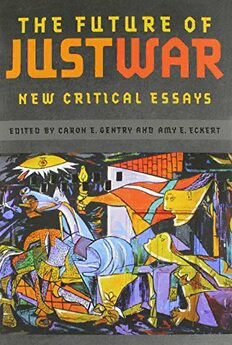
The Future of Just War: New Critical Essays PDF
Preview The Future of Just War: New Critical Essays
THE FUTURE OF JUST WAR THE UNIVERSITY OF GEORGIA PRESS 2013 This page intentionally left blank SERIES EDITORS William W. Keller Scott A. Jones Professor of International Aff airs, Center for Director of Export Control Programs, Center for International Trade and Security, University of International Trade and Security, University of Georgia Georgia SERIES ADVISORY BOARD Pauline H. Baker William J. Long The Fund for Peace Sam Nunn School of International Aff airs, Georgia Institute of Technology Eliot Cohen Paul H. Nitze School of Advanced International Jessica Tuchman Mathews Studies, Johns Hopkins University Carnegie Endowment for International Peace Eric Einhorn Scott D. Sagan Center for Public Policy and Administration, Center for International Security and University of Massachusetts, Amherst Cooperation, Stanford University John J. Hamre Lawrence Scheinman The Center for Strategic and International Monterey Institute of International Studies, Studies cns- wdc Josef Joff e David Shambaugh Hoover Institution, Institute for International The Elliott School of International Aff airs, Studies, Stanford University George Washington University Lawrence J. Korb Jessica Stern Center for American Progress fxb Center, Harvard School of Public Health This page intentionally left blank THE FUTURE OF JUST WAR New Critical Essays Edited by Caron E. Gentry and Amy E. Eckert The University of Georgia Press Athens and London © 2014 by the University of Georgia Press Athens, Georgia 30602 www .ugapress .org All rights reserved Set in Minion Pro by Graphic Composition, Inc., Bogart, Georgia. Printed and bound by Sheridan Books, Inc. The paper in this book meets the guidelines for permanence and durability of the Committee on Production Guidelines for Book Longevity of the Council on Library Resources. Most University of Georgia Press titles are available from popular e-book vendors. Printed in the United States of America 17 16 15 14 13 p 5 4 3 2 1 Library of Congress Cataloging- in-Publication Data Th e future of just war : new critical essays / edited by Caron E. Gentry and Amy E. Eckert. pages cm. — (Studies in security and international aff airs) Includes bibliographical references and index. isbn- 13: 978-0-8203-3950-4 (hardback) isbn- 10: 0-8203-3950-4 (hardcover) isbn- 13: 978-0-8203-4560-4 (paperback) 1. Just war doctrine. 2. War—Moral and ethical aspects. I. Gentry, Caron E., author, editor of compilation. II. Eckert, Amy, author, editor of compilation. u21.2.f874 2014 172'.42—dc23 2013020499 British Library Cataloging- in-Publication Data available ISBNfordigitaledition:978-0-8203-4653-3 CONTENTS Introduction 1 Caron E. Gentry and Amy E. Eckert section one. Jus ad Bellum chapter one. Epistemic Bias: Legitimate Authority and Politically Violent Nonstate Actors 17 Caron E. Gentry chapter two. Strategizing in an Era of Conceptual Change: Security, Sanctioned Violence, and New Military Roles 30 Kimberly A. Hudson and Dan Henk chapter three. Is Just Intervention Morally Obligatory? 48 Luke Glanville chapter four. Private Military Companies and the Reasonable Chance of Success 62 Amy E. Eckert section two. Jus in Bello chapter five. Postheroic U.S. Warfare and the Moral Justifi cation for Killing in War 79 Sebastian Kaempf chapter six. From Smart to Autonomous Weapons: Confounding Territoriality and Moral Agency 98 Brent J. Steele and Eric A. Heinze chapter seven. An Alternative to Nuclear Weapons? Proportionality, Discrimination, and the Conventional Global Strike Program 115 Alexa Royden chapter eight. Rethinking Intention and Double Eff ect 130 Harry D. Gould chapter nine. Just War without Civilians 148 Laura Sjoberg section three. Jus post Bellum chapter ten. Jus post Bellum: Justice in the Aft ermath of War 167 Robert E. Williams Jr. Contributors 181 Index 185 INTRODUCTION Caron E. Gentry and Amy E. Eckert Critical scholarship questions the ontological and epistemological construc- tions that are taken to be “natural,” a “given,” or too long- standing to question. Like security studies, terrorism studies, or international relations, the Just War tradition also contains such assumptions. The Just War tradition assumes a particular epistemic perspective: in this current global system, the state is the legitimate authority able to possess right intention, justify cause, and maneuver last resort and is the sole entity in possession of the ability to direct propor- tionate and discriminate violence. The presumptions in favor of the state can quickly lead to further presumptions that the state always acts justly when it wages war, that conventional weapons do not violate discrimination and pro- portionality, and that civilians, and not military forces, are at the center of a state’s consideration of moral harm. Such thinking creates operational binaries: states are always the legitimate author and nonstate actors illegitimate; the use of conventional weapons always falls within discrimination and proportional- ity, and nuclear weapons do not; military leaders need to consider the moral harm to noncombatants but not necessarily to soldiers. These operational binaries oft en lead to uncritical assessments of claims about war and justice. Epistemic assumptions and hermeneutics need to be challenged and rescripted in light of an international system where nonstate actors, including rebel groups, terrorist movements, criminal syndicates, and corporations, engage in political violence, where state-t o-state wars are on the decline, and where the imperative to reconfi gure sovereignty as a system of shared responsibility for individual well- being so as to require intervention for humanitarian purposes is becoming more accepted. Moreover, even when states do engage in war, their methods, strategies, and weapons are oft en presumed to be just even if they break the norms of war and the international system. Both by the immediate presumption of state legitimacy and through the claim of supreme emergency, state violations of international norms are oft en allowed to “slide.” Just as previous periods of political crisis have caused the tradition to change and grow, these new developments provide the prospect for similar
